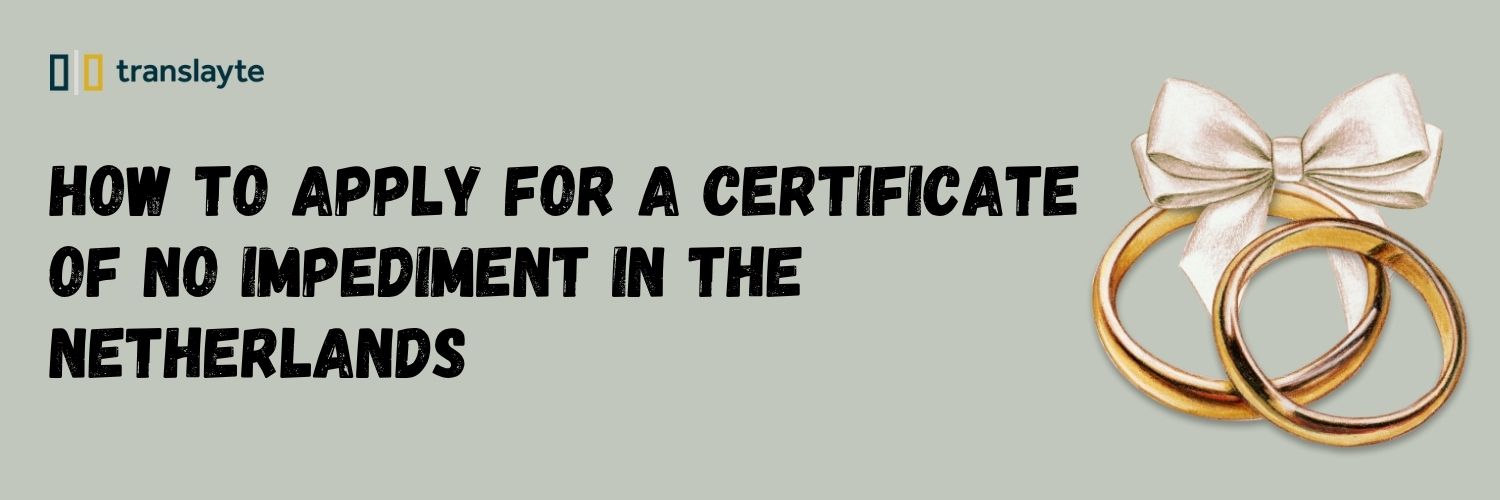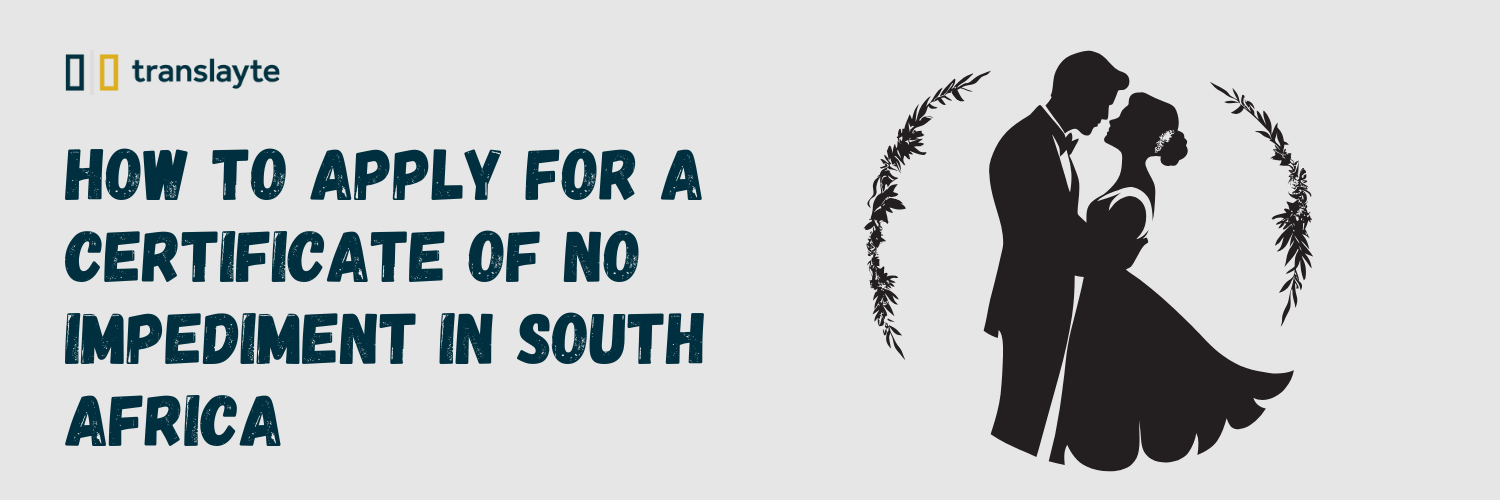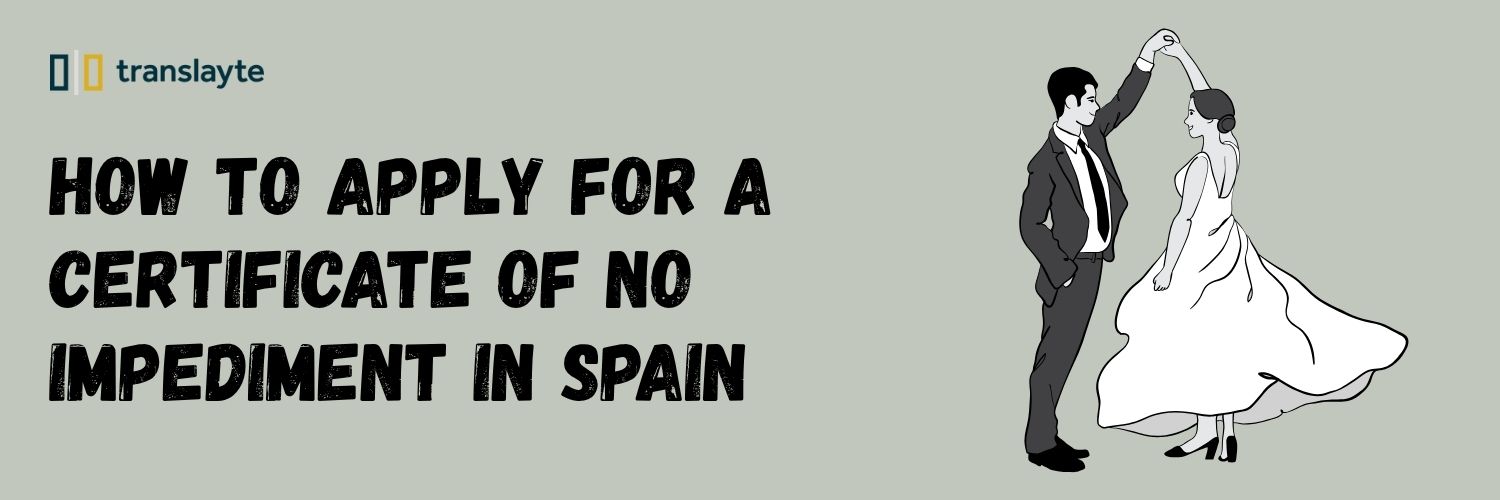What is a Certificate of No Impediment (CNI)?
A Certificate of No Impediment (CNI), known in Dutch as Verklaring van huwelijksbevoegdheid, is an official document that certifies that no legal impediment prevents you from getting married. It confirms your marital status and declares that, according to Dutch law, you are free to enter into marriage.
The CNI is distinct from other civil status documents, such as birth certificates or divorce decrees. However, you often have to submit birth certificates, divorce decrees and death certificates when applying for a CNI, depending on your situation.
Note: Dutch citizens and residents can obtain the CNI from their local Municipality (gemeente). Foreign nationals residing in the Netherlands may need to get a CNI from their home country's embassy or consulate, depending on the destination requirements.
Who needs a CNI and when?
A Certificate of No Impediment is commonly required in several scenarios:
Marrying abroad as a Dutch national or resident
If you are a Dutch citizen or registered resident marrying abroad, you must show proof that you are legally free to marry. This is a requirement set by the embassy, foreign registrar, or a civil authority in the country where you will marry. For example, if you are getting married in Italy as a Dutch citizen, you must obtain a Nulla Osta (Certificate of No Impediment) from:
The Dutch Consulate General in Milan, or,
The foreign affairs office in The Hague.
However, since the Netherlands is a party to the 1980 Munich Convention, the CNI won't require legalisation.
Foreign nationals marrying in the Netherlands
If you are getting married in the Netherlands as a foreigner, you must provide a CNI from your home country. This confirms that you have no legal impediments under their own country's laws. For example, if you are getting married as a French citizen in the Netherlands, you must obtain the CNI, known as Certificat de capacité matrimoniale or Certificat de célibat. You can obtain the document at the French consulate or embassy in the Netherlands, or at the local mairie (town hall) in France.
Note: Depending on the destination or your foreign partner's country, you may need alternative documents, such as a single-status or marital-status declaration instead of a formal CNI. Some countries that request or issue alternatives include the UK, Canada, Germany and Nordic states. Always verify the specific requirements with the relevant foreign authority before beginning the application process.
Where to apply: Municipality, Embassy or Consulate
In the Netherlands, you can apply for a CNI at the Municipal, Embassy or Consulate. The application location depends on your residence status and nationality:
Municipality office
If you live in the Netherlands and are registered in the Dutch Personal Records Database (BRP), you should apply for your CNI at the Municipality (gemeente) where you reside. Each Municipality has its own rules, requirements, application process, documents, and fees.
However, you should prepare the supporting documents you need, such as a birth certificate, divorce decree, and death certificate, based on your situation. Many municipalities require you to book an appointment in advance for an in-person CNI application. Some larger cities offer online application options or allow you to submit documents by post, but this varies significantly.
Embassy or Consulate
Dutch citizens residing abroad can apply for a CNI at the Embassy or Consulate in that country. For example, if you are getting married in Italy, you can apply for your CNI at the Dutch embassy in Rome or the Consulate-General of the Netherlands in Milan, Italy.
Note: Some countries may not accept a CNI issued by the Embassy or Consulate. So always confirm the requirements before applying.
Find the Dutch Embassy and Consulate in different countries.
Documents required to apply for a Certificate of No Impediment (CNI) in Netherlands
Birth certificate: A recent extract of your birth certificate, typically issued within the last six months. If you were born outside the Netherlands, an official birth certificate from your country of birth, with an apostille or legalisation, may be required.
Partner's details: Information about your intended spouse, including their full name, date of birth, nationality, and place of birth. Some municipalities require a copy of your partner's passport or ID.
Sworn translations (If required): If your documents are not in Dutch or English, sworn translations may be required. Requirements vary by Municipality: some accept English documents directly, while others require them to be translated by a sworn translator in the Netherlands.
Apostille or legalisation: Foreign documents may need to be apostilled or legalised before the Dutch Municipality will accept them. This applies particularly to birth certificates, divorce decrees, and death certificates issued outside the Netherlands.

How can you apply for a Letter of No Impediment in the Netherlands
The application process for a Certificate of No Impediment to marriage in the Netherlands follows these key steps:
Check the destination country's requirements
Contact the civil registry office, embassy, or relevant authority in the country where you plan to marry. You can find contact information on the respective website or visit the office in person. You should verify the certificate requirements, including whether translation is needed, the validity period, and whether an apostille or legalisation is necessary. Some countries have specific format requirements or only accept CNI documents issued within a particular timeframe before the wedding date.
Gather required documents
Collect all necessary documentation in accordance with your Municipality's requirements and the destination country's specifications. This includes your valid identification, recent birth certificate, proof of residence, civil status documents, and partner information. Ensure any foreign documents have been properly apostilled and, if required, translated.
Apply for the CNI
Contact your local Municipality, Embassy or Consulate to schedule an appointment or submit your application. Application methods vary:
Specific locations, such as The Hague, accept applications by post, but only in cases where you are unable to apply in person. You'll have to send a registered letter to the Department of Public Service. State in this letter that you would like a certificate of no impediment.
Pay fees and wait for processing
Pay the required fees at the time of application. Processing times vary significantly by Municipality, ranging from a few days to several weeks.
Obtain an apostille or legalisation if required
If the destination country requires an apostille, you must obtain this separately after receiving your CNI. In the Netherlands, apostille stamps for Dutch documents are issued by designated courts or the Ministry of Foreign Affairs. Non-Hague Convention countries may require legalisation by the embassy instead. This option involves additional steps through the Ministry and the foreign country's embassy.
Provide certified translations if requested
If the receiving authority requires your CNI in a specific language other than Dutch, arrange for a certified or sworn translation. The type of translation needed (certified, sworn, or juror translation) depends on the destination country's regulations. Some countries accept standard certified translations, while others specifically require sworn translations by a court-appointed translator.
Note: Begin the application process at least two to three months before your intended wedding date. Applying early helps you prepare your documents and also account for processing times, apostille requirements, and any unexpected documentation issues.

Processing times, validity and fees
The Dutch CNI processing time is between 1 day and 6 weeks, is valid for 6 months, and fees range from $28 to $70. Here's what you should know
Processing time
The processing time for Dutch CNI depends on the application method. If you apply in person, you can receive the document immediately after your appointment. However, if you apply by post, the processing time can range from 3 to 6 weeks.
Validity
The Certificate of No Impediment in the Netherlands is valid for up to 6 months, depending on the receiving authority.
Fees
The CNI application fees vary by location. If you apply to the Municipality in the Netherlands, you can expect to pay a fee of at least €28. For example, if you apply in Schagen, the cost is €28.70, while in The Hague it is €29.80.
Do you need certified translations or apostille services for your CNI application? Request a free quote to get started; no document uploads are required.
Do I need an Apostille or Legalisation on the CNI?
Whether you need a Certificate of No Impediment apostille stamp or legalisation depends on the destination country's membership in the Hague Apostille Convention:
Hague Convention countries
If you're marrying in a country that is party to the 1961 Hague Apostille Convention, your CNI will require an apostille. An apostille is a standardised certificate that authenticates the document for use in foreign countries. The apostille verifies the signature and seal of the Dutch official who issued your CNI, making it legally recognised abroad.
In the Netherlands, apostilles for Dutch civil documents are typically obtained from:
The court in the district where the document was issued
The Ministry of Foreign Affairs in The Hague
Designated municipal courts with apostille authority
The apostille process usually takes one to two weeks and involves an additional fee beyond the CNI cost.
Non-Hague Convention countries
If your destination country is not a member of the Hague Convention, you'll need embassy legalisation rather than an apostille. This more complex process involves:
Embassy legalisation takes significantly longer than apostille services, often requiring three to six weeks or more, depending on the specific embassy's procedures.
Do I need a translation of the CNI? (Certified/Sworn)
If the receiving civil authority requires your Certificate of No Impediment in a language other than Dutch, a certified or sworn translation will be necessary:
Certified translations
A certified translation is produced by a professional translator who certifies the accuracy and completeness of the translation. The translator provides a signed statement (certification) confirming the translation is a true and accurate representation of the original document. Countries like the United States, the United Kingdom, Australia, and Canada accept certified translations for most administrative purposes.
Sworn/juror translations
Some countries like Germany, Italy, and Spain specifically require sworn translations (also called juror translations or beëdigde vertalingen in Dutch). These translations are performed by court-appointed or officially registered sworn translators who have taken an oath to translate faithfully and accurately.
Ready to ensure your Certificate of No Impediment meets all international requirements? Request a free quote for your certified translations now, no document upload required.



